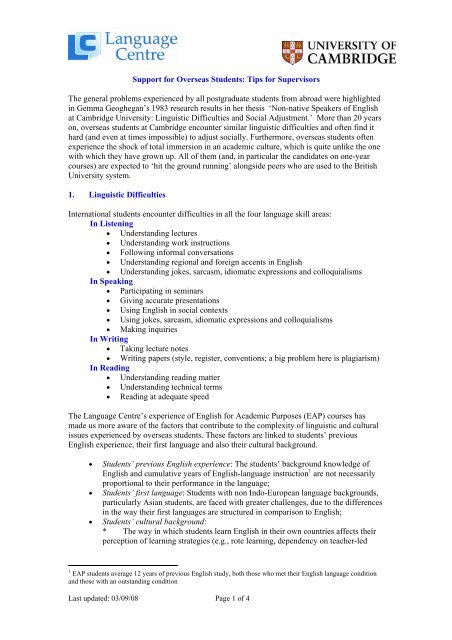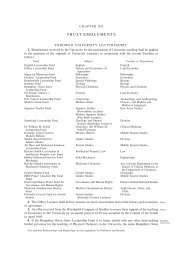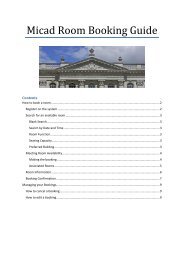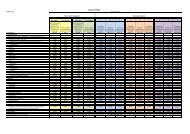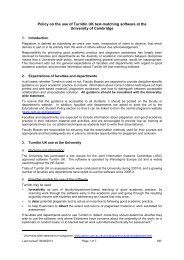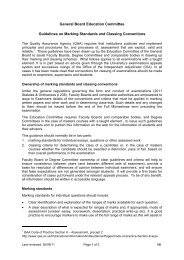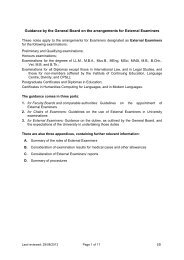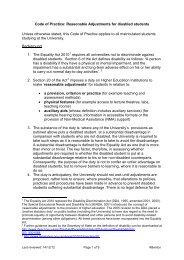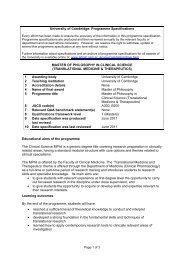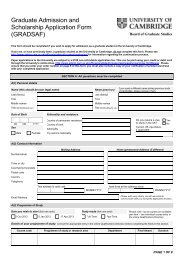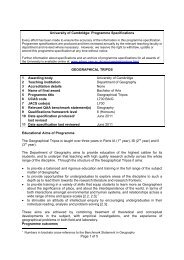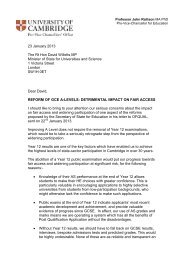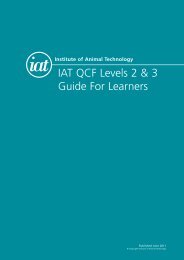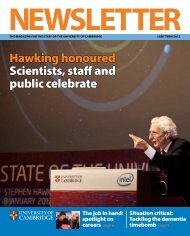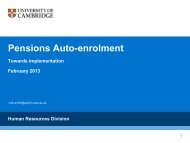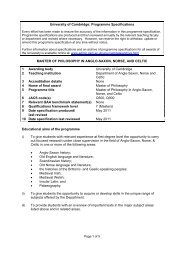Support for Overseas Students: Tips for Supervisors - University of ...
Support for Overseas Students: Tips for Supervisors - University of ...
Support for Overseas Students: Tips for Supervisors - University of ...
You also want an ePaper? Increase the reach of your titles
YUMPU automatically turns print PDFs into web optimized ePapers that Google loves.
<strong>Support</strong> <strong>for</strong> <strong>Overseas</strong> <strong>Students</strong>: <strong>Tips</strong> <strong>for</strong> <strong>Supervisors</strong><br />
The general problems experienced by all postgraduate students from abroad were highlighted<br />
in Gemma Geoghegan’s 1983 research results in her thesis ‘Non-native Speakers <strong>of</strong> English<br />
at Cambridge <strong>University</strong>: Linguistic Difficulties and Social Adjustment.’ More than 20 years<br />
on, overseas students at Cambridge encounter similar linguistic difficulties and <strong>of</strong>ten find it<br />
hard (and even at times impossible) to adjust socially. Furthermore, overseas students <strong>of</strong>ten<br />
experience the shock <strong>of</strong> total immersion in an academic culture, which is quite unlike the one<br />
with which they have grown up. All <strong>of</strong> them (and, in particular the candidates on one-year<br />
courses) are expected to ‘hit the ground running’ alongside peers who are used to the British<br />
<strong>University</strong> system.<br />
1. Linguistic Difficulties<br />
International students encounter difficulties in all the four language skill areas:<br />
In Listening<br />
• Understanding lectures<br />
• Understanding work instructions<br />
• Following in<strong>for</strong>mal conversations<br />
• Understanding regional and <strong>for</strong>eign accents in English<br />
• Understanding jokes, sarcasm, idiomatic expressions and colloquialisms<br />
In Speaking<br />
• Participating in seminars<br />
• Giving accurate presentations<br />
• Using English in social contexts<br />
• Using jokes, sarcasm, idiomatic expressions and colloquialisms<br />
• Making inquiries<br />
In Writing<br />
• Taking lecture notes<br />
• Writing papers (style, register, conventions; a big problem here is plagiarism)<br />
In Reading<br />
• Understanding reading matter<br />
• Understanding technical terms<br />
• Reading at adequate speed<br />
The Language Centre’s experience <strong>of</strong> English <strong>for</strong> Academic Purposes (EAP) courses has<br />
made us more aware <strong>of</strong> the factors that contribute to the complexity <strong>of</strong> linguistic and cultural<br />
issues experienced by overseas students. These factors are linked to students’ previous<br />
English experience, their first language and also their cultural background.<br />
• <strong>Students</strong>’ previous English experience: The students’ background knowledge <strong>of</strong><br />
English and cumulative years <strong>of</strong> English-language instruction 1 are not necessarily<br />
proportional to their per<strong>for</strong>mance in the language;<br />
• <strong>Students</strong>’ first language: <strong>Students</strong> with non Indo-European language backgrounds,<br />
particularly Asian students, are faced with greater challenges, due to the differences<br />
in the way their first languages are structured in comparison to English;<br />
• <strong>Students</strong>’ cultural background:<br />
* The way in which students learn English in their own countries affects their<br />
perception <strong>of</strong> learning strategies (e.g., rote learning, dependency on teacher-led<br />
1 EAP students average 12 years <strong>of</strong> previous English study, both those who met their English language condition<br />
and those with an outstanding condition<br />
Last updated: 03/09/08 Page 1 <strong>of</strong> 4
environments, the development <strong>of</strong> descriptive skills versus communicative teaching<br />
and critical thionking, etc.)<br />
* <strong>Students</strong>’ perceptions <strong>of</strong> social norms as well as concepts <strong>of</strong> respect,<br />
solidarity, reflection, etc. are affected by how these notions are perceived in<br />
students’ own countries.<br />
2. Social Adjustment<br />
<strong>Overseas</strong> students are expected to adjust to their new surroundings almost immediately. Quite<br />
apart from having to cope with the course material, they must understand quickly ‘how<br />
Cambridge works’, be able to differentiate knowingly between the function and role <strong>of</strong> a<br />
college versus a department and grasp confidently their supervisors’ expectations and<br />
departmental demands.<br />
It is important to note that the most common phases <strong>of</strong> social acculturation follow a similar<br />
pattern to linguistic adjustment, which confirms the view that language and cultural issues<br />
cannot be separated in the establishment <strong>of</strong> varied avenues <strong>of</strong> support:<br />
o<br />
o<br />
o<br />
o<br />
o<br />
Phase 1: enthusiastic introduction to a new culture and environment marked by<br />
determination, dedication, energy and high expectations <strong>of</strong> per<strong>for</strong>mance (self and<br />
other), and typically known as the ‘honeymoon stage’;<br />
Phase 2: frustration upon facing the unknown and feelings <strong>of</strong> uncertainty about how<br />
to interact appropriately; can be marked by a loss <strong>of</strong> confidence;<br />
Phase 3: pressure to per<strong>for</strong>m and be accepted;<br />
Phase 4: succumbing to the pressures combined with building a certain resistance<br />
against new values, identities, and ways <strong>of</strong> expressing oneself;<br />
Phase 5: learning to cope and coming to terms with one’s new environment; building<br />
an understanding <strong>of</strong> the language and environment; building a new language and<br />
cultural identity.<br />
<strong>Students</strong> who have previously been abroad are less likely to experience phases 2 and 4.<br />
However, all students experience phases 1, 3 and 5.<br />
Problems with social and cultural adjustment can take various <strong>for</strong>ms. A student could have<br />
difficulty making himself or herself understood or in understanding how to participate in<br />
conversations in English. S/he could there<strong>for</strong>e remain isolated from English native speakers.<br />
In addition, differences in social customs, cultural traditions, ways <strong>of</strong> interacting with others<br />
and societal values can cause gaps in students’ understanding <strong>of</strong> their host culture and vice<br />
versa, and possibly lead to other common features <strong>of</strong> study abroad experiences, such as<br />
homesickness, rejection <strong>of</strong> the host culture, depression, de-motivation and isolation. These<br />
cultural and social factors influence every aspect <strong>of</strong> the international students’ daily lives,<br />
from accommodation and dietary needs to their study and social interaction.<br />
Added to these factors is the discrepancy between expectations in the <strong>University</strong> and students’<br />
own expectations.<br />
3. Expectations in the <strong>University</strong><br />
Expectations in the <strong>University</strong> are high. They come from all corners, departmental and<br />
collegial, parental and self-imposed. These expectations can be explicit or implicit, open or<br />
tacit. <strong>Overseas</strong> students are expected not only to be high achievers in their respective subjects,<br />
but also to adapt seamlessly to the British educational system in general and Cambridge in<br />
particular. However, there are discrepancies between these expectations and reality.<br />
Last updated: 03/09/08 Page 2 <strong>of</strong> 4
<strong>Students</strong>’ expectations <strong>of</strong> themselves as learners <strong>of</strong>ten encounter difficulties due to:<br />
• Their unrealistically high expectations <strong>of</strong> themselves upon arrival at Cambridge and<br />
their <strong>Supervisors</strong>’ and tutors’ high expectations <strong>of</strong> their rate <strong>of</strong> progress. This can<br />
hamper their own success and increase their rate <strong>of</strong> failure.<br />
• Their opinions <strong>of</strong> their strong and weak areas in English, which may conflict with<br />
reality. For instance, they <strong>of</strong>ten believe their writing to be a strength 2 , when, in fact, it<br />
<strong>of</strong>ten proves to be a weakness.<br />
There are also discrepancies between students’ test per<strong>for</strong>mance and true language ability:<br />
• In certain cultures, where studying to the test is common, students tend to achieve<br />
average to good marks on an English test, but per<strong>for</strong>m at a much lower level in daily life;<br />
• In contrast, a student may per<strong>for</strong>m badly on an English test, but an in<strong>for</strong>mal<br />
assessment <strong>of</strong> academic presentation and writing styles shows a much deeper and<br />
more advanced command <strong>of</strong> English.<br />
Perhaps the biggest discrepancy is in the widespread assumption in the <strong>University</strong> that if<br />
students have the English pr<strong>of</strong>iciency test required, it means that their level <strong>of</strong> English is<br />
good enough <strong>for</strong> them to follow their particular field <strong>of</strong> study. Even when their level <strong>of</strong><br />
English is necessary <strong>for</strong> their <strong>University</strong> subject, this does not necessarily mean that it is also<br />
sufficient.<br />
<strong>Support</strong> is less effective if students themselves are not ‘culturally’ geared to getting the help<br />
and support they might need. Some <strong>of</strong> our overseas students are not ‘culturally’ programmed<br />
to ‘go and get’ the help and care that is available.<br />
4. EAP<br />
The Language Centre’s English <strong>for</strong> Academic Purposes programme is designed to meet the<br />
needs <strong>of</strong> the growing population <strong>of</strong> incoming postgraduate overseas students to Cambridge<br />
<strong>University</strong>:<br />
http://www.langcen.cam.ac.uk/courses/courses.php?c=3<br />
The objectives <strong>of</strong> the summer Pre-sessional course (August-September) are to enable its<br />
participants to:<br />
• follow courses and undertake research at the <strong>University</strong>;<br />
• become independent within the academic context <strong>of</strong> the <strong>University</strong>;<br />
• feel com<strong>for</strong>table with the cultures <strong>of</strong> the <strong>University</strong>, Cambridge and the UK.<br />
The main course objective <strong>of</strong> the EAP In-sessional course is to provide continued language<br />
and cultural support to postgraduate overseas students during the academic year. <strong>Students</strong><br />
may join the In-sessional programme, either voluntarily or be referred by their Faculty or<br />
College:<br />
http://www.langcen.cam.ac.uk/courses/courses.php?c=14<br />
The In-sessional course is delivered through:<br />
• termly workshops focusing on practical problems and strategies relating to integrated<br />
skills practice and<br />
2 Another concern, particularly amongst students from the Far East, is that <strong>of</strong> plagiarism. To Japanese or Chinese<br />
students it is a mark <strong>of</strong> respect to the scholars they read to ‘use’ their writings in a way which does not distinguish<br />
between the scholars’ writings and their own. To our Western ways, this is plagiarism.<br />
Last updated: 03/09/08 Page 3 <strong>of</strong> 4
• termly one-to-one or two-to-one supervisions concentrating on individual needs and<br />
the details <strong>of</strong> academic writing.<br />
• online learning opportunities.<br />
There is also continued self-access support throughout the academic year. Small group<br />
tutorials, a student-initiated online discussion <strong>for</strong>um, regular in<strong>for</strong>mal conversation hours <strong>for</strong><br />
sustained oral practice and vocabulary building as well as additional social gatherings enrich<br />
the In-sessional course.<br />
5. Recommendations <strong>for</strong> supervisors<br />
Although students’ linguistic problems vary, the following are a set <strong>of</strong> useful tips that EAP<br />
supervisors have found helpful:<br />
1) If a student is suffering from listening difficulties, it is likely that they are focusing<br />
too much on listening word <strong>for</strong> word. They need to be reminded <strong>of</strong> the purpose <strong>for</strong><br />
listening (i.e. listening <strong>for</strong> gist versus specific detail)<br />
2) If a student is suffering from reading problems, it is likely that they are reading word<br />
<strong>for</strong> word. They need to understand that the reading process mirrors the listening<br />
process.<br />
3) If a student is having trouble speaking, it is usually related to their lack <strong>of</strong> practice<br />
and level <strong>of</strong> confidence in per<strong>for</strong>ming orally in the language.<br />
4) If a student is having trouble with academic writing, it is usually because they have<br />
not developed their command <strong>of</strong> English <strong>for</strong> academic writing, both on the levels <strong>of</strong><br />
structure and register, especially if they come from an Asian or Eastern European<br />
culture, where a circular rather than linear style <strong>of</strong> writing prevails. Logical flow and<br />
the gradual build-up <strong>of</strong> ideas need to be encouraged and papers tackled in manageable<br />
chunks.<br />
In terms <strong>of</strong> reviewing students’ work, it is in their interest if the supervisor underlines or<br />
highlights grammatical problems and poses questions in the margins, such as ‘what do you<br />
mean here?’, ‘why?’, ‘why is this important?’ and ‘how?’ in early drafts in order to stimulate<br />
the students’ reflective processes and self-editing skills. Later revisions can be commented on<br />
in more detail, once the structure <strong>of</strong> a paper is clear and the main ideas have been welldefined<br />
by the student him/herself. This process may be pain-staking <strong>for</strong> the first paper, but<br />
well worth the time saved on later papers, once the student knows ‘how to’ approach an<br />
academic paper in English.<br />
The Language Centre can provide more detailed advice on all the above areas to supervisors<br />
and students. Please contact Nicola Cavaleri by email (nch23@cam.ac.uk) with any questions<br />
or concerns.<br />
Thank you <strong>for</strong> your support <strong>of</strong> Cambridge’s overseas students!<br />
Anny King, Executive Director<br />
Nicola Cavaleri, Language Learning Adviser / EAP Director<br />
Language Centre, <strong>University</strong> <strong>of</strong> Cambridge<br />
Last updated: 03/09/08 Page 4 <strong>of</strong> 4


